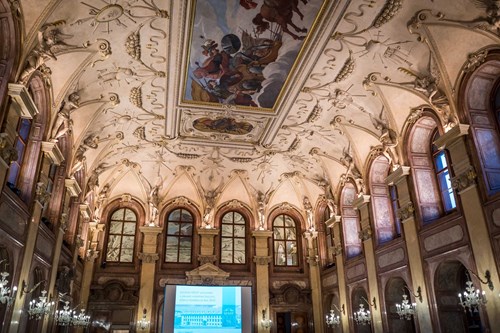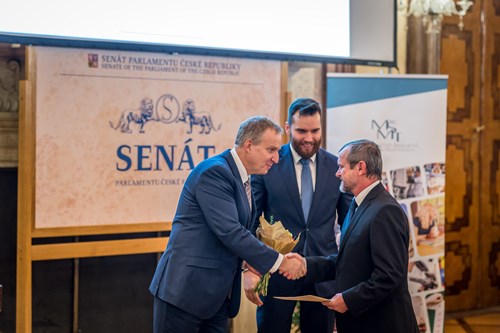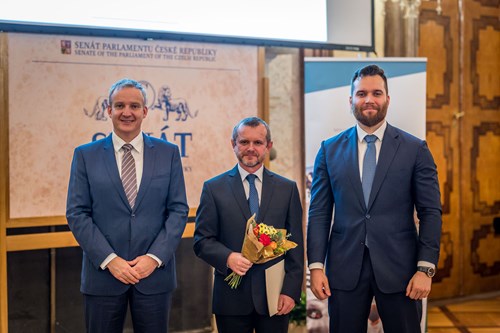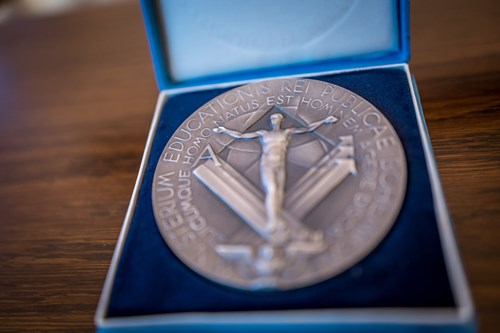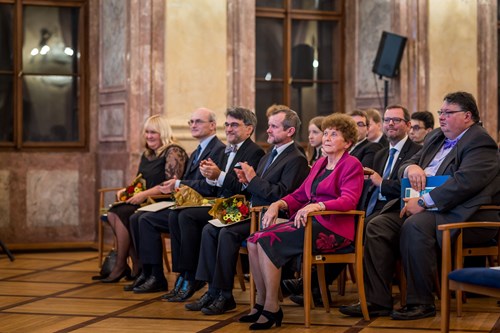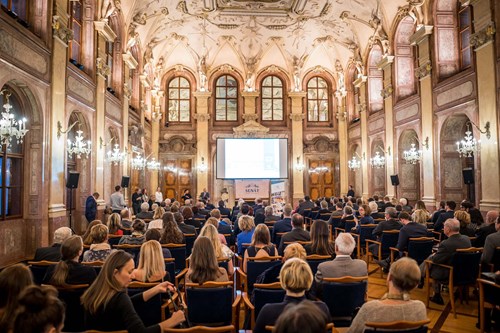What first came to your mind when you learned that you were awarded the Minister of Education Award for educational activities at a university?
What first came to your mind when you learned that you were awarded the Minister of Education Award for educational activities at a university?
Two things were in my mind. The first, of course, was a feeling of great joy and honour. Even being nominated within the faculty made me happy, and I was really pleased when the nomination became an award. And the other emotion? I was thinking about the winner selection process. The first selection screen was held at the faculty, the second at the university and the final one at the Ministry itself. Some of the candidates had to survive the three ‘sieves’ and I was one of them. Undoubtedly, subtle nuances between the nominees played a role, and in the end I was among the five chosen. I do not think that I am among the top five lecturers at universities in the country; perhaps among the first one or two hundred in the Republic, and that is in itself a great honour. By coincidence, I was one of the five, but I am convinced that someone else from this building, faculty or university could equally have received such an award. Take it this way, I am not preparing a T-shirt with the inscription “Holder of an Award from the Ministry of Education”.
How did you develop your relationship to physics? Did your previous teachers play a role?
My teachers were good, but they were not the main motive. There was no single moment that triggered it. It can happen today when a child visits the VIDA science centre, with the experience starting a long-term relationship within the field. For me, it was a gradual process. At elementary school I used to enjoy chemistry for a while; I remember that me and my friends wanted our own chemical laboratory - a dangerous idea – but that faded. What I liked about physics and mathematics was the logical reasoning behind it, with one thing coming directly from another. In other subjects, I was discouraged by the fact that a lot of information was memorised, which I do not do particularly well. Instead, I like to think about things, and this led naturally to mathematics and physics. Physics prevailed because it related directly to the real world, while mathematics seemed too abstract. There is nature in physics - theories and experiments explaining phenomena that one has been experiencing since childhood but not thinking about. Suddenly, I could understand how it worked and why it was as it was. My father also played a big role here. He only had an engineering school qualification but he encouraged my interest in physics and technology. I still remember how he explained to me what a horse was in terms of power units. "It’s like lifting 75 kg up to one metre in one second", he told me. As a kid, I was crazy about cars and what horsepower they had was always my first question. Up to then, “horsepower” had been an unintelligible concept but after this explanation it suddenly became totally clear. I still use my father’s explanation to teach today. This, and a number of similar experiences, kept my interest in physics alive and my relationship with physics grew gradually from then on.

Zdeněk Bochníček is involved in the organisation of popularisation activities related to physics, one of them being Physical café. Photo: Rastislav Bača
What do you like most about physics as a field?
Physics is beautiful from two angles. On the one hand, it can faithfully describe natural processes with difficult theories and demanding mathematics, allowing us to create technical applications based on such descriptions. This is one aspect of the beauty and power of physics. The second reason, and one that appeals to me a lot, is that physics can make good estimates using simple models. For the subjects I teach here, such as ‘Physics in Living Nature’ and ‘Physics for Chemists’, this second aspect is of great interest. Physics is about connections and relationships. Before we can examine these there is always a set of facts and formulas to memorise; however, once these facts have been mastered, natural phenomena are so much easier to understand.
Do you have a favourite physicist? Who and why?
If I could mention just one it would be the Nobel Prize winner Richard Feynman. I was captivated by his physics textbook, one of a number I used to study physics. I was also greatly impressed with the popular science books he wrote, such as ‘Surely you’re joking’, a humorous and, in my opinion, healthy view of the world.
How did you start teaching physics at the Faculty?
I started work at the faculty after a five-year period of professional (non-teaching) work in physics, as what would today be called a ‘researcher in applied research’, cooperating with large industrial companies such as Tesla Roznov and ČKD Polovodiče. I undertook a number research projects during that time in what was then the Department of Solid State Physics. After the 1989 revolution, an assistant position at the Department of General Physics became vacant and I passed the selection procedure. Teaching physics attracted me, even though I wasn't thinking about teaching physics at all when choosing a college. Actually, I do not have any teaching qualifications, what teaching skills I do have were probably shaped by tutoring individual students.
So what did tutoring teach you?
It started purely as friendly help in elementary school. Later, in high school, I turned it into a commercial venture and, even after I had small children, I still tutored several hours a week. I learned a lot from this; for example, when you say something you see how the pupil reacts to it - you have direct interaction with each other - and when you find that it didn't work, you think “How else could I say it? What picture could I paint to help them understand?” If you teach a large class in a school you don't have this. While the teacher may think the subject has been perfectly explained, he or she has no idea what is happening in the minds of the students. I would encourage any young students at high school who enjoy tutoring to study teaching, they will find their lives fulfilled.
How long have you been teaching physics at MU?
I have been teaching here for more than a quarter of a century. After graduation, I remained in the faculty and, basically, never left this floor. I am not saying this as an advantage or disadvantage; I just state it as a fact.
When you started teaching physics was it difficult in any way?
Definitely yes, though it wasn't about being afraid to stand in front of a classroom and give lectures. While I consider myself quite introverted outside of teaching, I become a different person in the class and the introverted features seem to disappear. What was particularly challenging for me was the preparation of lecture and seminar content.
Are there topics you have reworked several times before you were happy with the interpretation?
As I browsed through the preparation material for teaching Physics for Chemists, I noticed that about one-third did it differently than I did at the beginning. This is because I have experience with students. I try to teach verbally only, even though I have 150 students, because I learn a lot more about their knowledge and abilities. During oral examinations, I sometimes reveal ignorance and shortcomings that I never expected before. Unfortunately, because I want what I am interpreting to be appropriate in content and scope, this sometimes means I have to reduce the curriculum somewhat. I tend to modify lectures so that I include a more detailed explanation of the topic that was previously misunderstood; however, this gives me less time for more and perhaps more difficult topics.
Do secondary school students appear to be less well prepared?
While surveys sometimes show that they are not, I feel that they are generally less well prepared. But even in ancient Rome, people complained that the youth were terrible 😊. The fact is that almost all of us had mathematical knowledge, such as derivatives and differential calculus, or at least passed it. Now there are fewer and fewer such students.
What do you think is the basis of success in explaining physics to students?
Trying to start at their level; which is almost impossible as it is different for each student. Still, I try to identify the students’ present level of knowledge, the point at which they are sure they want to start and continue. The idea is that I don't start "high" and continue "even higher" as this would be a waste of educational effort. It helps to remember how I learned the subject myself, what was causing me problems and at what point I understood. I try to remember my own "aha! moments" and apply them to teaching. I also often include examples. For first-year students, the patterns are often made clearer by substituting specific numbers in which they can count more easily. I also do not hesitate to say something I think is funny (I am glad when the students laugh!), then I think students see how much I enjoy physics and teaching. Although the student may have no relationship with physics, it has a really positive impact when they see that such a strange subject can be so much fun.
You are preparing students for a future profession teaching physics at the faculty. The faculty has undergone a lot of innovation since 2010, can you give some examples as to how it has changed ?
I think that students undergoing teacher training have a different level of motivation to those of so-called vocational studies. In my opinion, the need to teach is the stronger motivation, not physics or natural science in itself. The order of priorities should be “I would like to teach … and I like physics”. In the past, the Bachelor’s study programme was mainly based on scientific study, while teaching and practical education come to the fore in the Master's degree program, these aspects being more theoretical in the Bachelor’s degree. As such, it was not always clear to those students with a strong motivation to teach that the course was actually heading towards teaching. This is one of the reasons we introduced the course “Inspiratorium for Teachers” in 2012, where students can develop their teaching skills at the very start of their studies. Indeed, a great innovation in all new teacher study programs has been a substantial increase in actual teaching practice.
How would you describe the education of future physics teachers in a subject generally perceived as very difficult?
Compared to some other disciplines, the physics teacher has less direct information to communicate. On the other hand, they need to be able to explain relationships and contexts and to draw concrete consequences from known laws or rules. They teach and understand physics. Our teaching students must first learn physics well, then there is another, higher level needed to communicate logically with an orderly structure. In this, physics is closer to mathematics; hence, it is usually best to study physics in combination with mathematics.
In 2012 you took a part-time job at Křenová Grammar School. How did the experience of teaching physics in high school help you as regards preparing teachers of future physicists?
It seemed unusual for me to prepare physics teachers for a job I had never done myself. I wasn't sure I always gave them good advice. I have a lot of respect for high school teachers and their experiences. For me, gaining experience as a high school teacher was a great benefit as it lessened the risk of giving students bad advice. I also gained in self-confidence. Now I can say, "I did it this way!", and that was the main motivation for me. Initially, I went to both the Křenová and Captain Jaroš Avenue Grammar Schools in Brno, and both Directors agreed to take me, even though they knew I had no teaching qualifications. Ultimately, I decided for Křenová Grammar School as my children were studying at Jaroška and they said, “Never!” (laughter). At Krenova, I was given a first year class and taught them three years of compulsory physics. I decided then that two-hours of teaching physics at high school would be a permanent part of my work…then I became vice-dean for study and lost the courage to do it. However, I still think about it and I love to remember those times.
How does secondary school teaching differ from faculty teaching?
In high school, the relationship with students is more personal. You teach them continuously for three years, they are more accessible to education and you have a greater opportunity to inspire them. I also had the experience of personally matriculating seven of these students here at the faculty, four of which graduated…but not in physics 😊. As my time as vice-dean comes to an end, I intend to return to teaching in high school. Indeed, I am already looking forward to it!




